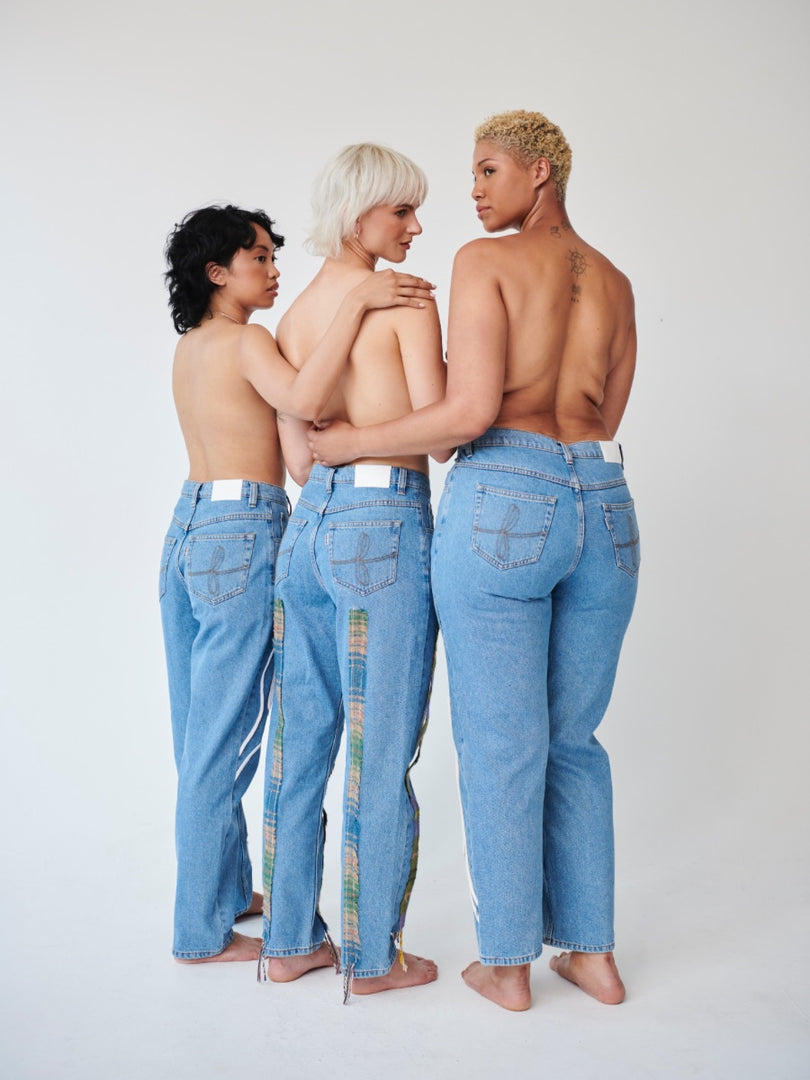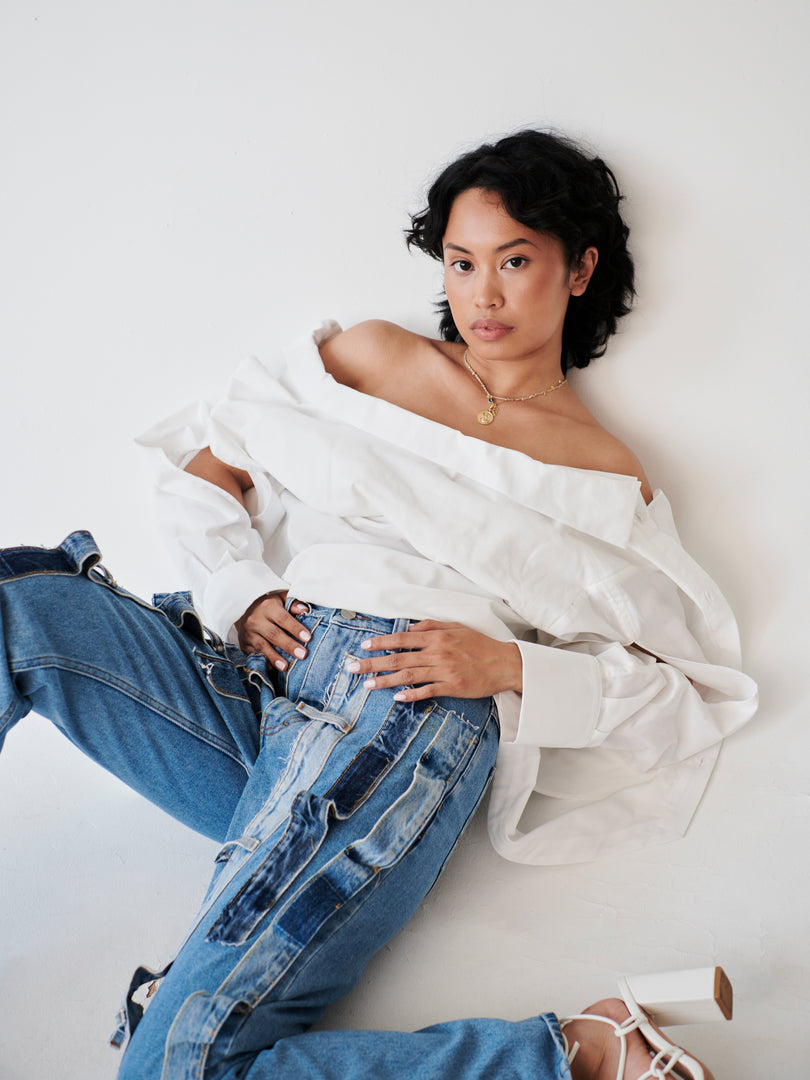What to look out for before making a purchase? Esther Knight, Founder of Fanfare Label shares her tips and advice alongside other sustainability and denim experts in the recent Harpers Bazaar article.

Sustainable. Eco. Green. Conscious. Recycled. We regularly read these words on the tags of our clothes, but what do they actually mean? How do you know if what you are buying is actually good for the planet, and what do you need to look out for when shopping?
To clear up any confusion, we enlisted industry experts to help us compile the ultimate guide to building a sustainable wardrobe – starting with denim.
Although creating clothes can harm our world, there are plenty of brands working hard to leave as little impact as possible on our planet while creating stylish denim pieces we can love forever.
But what happens once you've finished with your garment? What you do with your old denim is just as important as shopping smartly – ensuring that clothes don't end up in landfills is crucial to shopping and living responsibly. Fanfare Label is a shining example of how fashion brands can reduce waste; it focuses on upcycled denim, turning excess clothing and textiles into unique contemporary designs.
To put it simply, when shopping for sustainable denim, there are four main factors to consider before you make your purchase:
- Traceability – make sure you know where your garment has come from
- Materials – understand what your garment is made from and how that can impact the environment
- Longevity – invest in good-quality products that will last a lifetime
- Circularity – check that the item can be recycled and given a new lease of life once you're done with it
What tips would you give our readers for shopping sustainable denim?
Esther Knight, Fanfare Label: "Check your labels for information about the country or origin, factory and materials. Is anything missing about the supply chain? Check for transparency – see if the brand knows about the full production process and tells you about it. Finally, check the materials – are there any certifications associated with the claims so that you know the materials, supply chain and processing have all been investigated?"
What’s the biggest misconception about sustainable denim?
Esther Knight, Fanfare Label: "Personally, I think misconceptions are down to not having enough information on the supply chain as a whole. Brands will often tell you part of the story and miss out on certain information about the factories and garment workers, focusing instead on the materials. Sustainability claims are difficult to assess due to the lack of information. Denim is one of the most harmful items to produce due to the finishing and dyeing processes containing hazardous materials. Therefore, it is highly important that workers are protected and corners are not cut in order to save costs."
Why is regular denim bad for the environment?
Esther Knight, Fanfare Label: "Jeans are one of the most unsustainable fashion products on the market. According to Fashion Revolution, cotton is the thirstiest plant used, which requires 10,000 litres of water to produce just one pair of jeans and a t-shirt. Harmful chemicals are dyes used to achieve the colour and due to the amount of processing denim must go through, it can be very harmful to workers breathing in these chemicals.
"At Fanfare Label, we use laser processing Ozone techniques, eliminating the use of these chemicals. The way regular denim jeans are made and designed makes it difficult to recycle and repurpose them after use – but it's vital that you can in order to prolong their life span and ensure multiple product life cycles."
Are there any other ways to be greener when shopping for denim?
Esther Knight, Fanfare Label: "Slowing down and considering purchases often leads to more thoughtful, sustainable shopping. Bringing value back to the items we have in our wardrobes and new purchases means that we are more likely to cherish items and not regard fashion items as disposable. Look after your clothing, make it last and buy items that will be relevant in your wardrobe for years to come."
Why is traceability so important when shopping sustainably?
Esther Knight, Fanfare Label: "Traceability is important as it looks after the workers and people who have been involved in the production right through to the end garment. It allows brands to deeper analyse the origin, fibres, materials, chemical dyes and workers involved in the supply chain. Without traceability, knowledge about the supply chain is not there and brands cannot guarantee sustainability or make positive changes where necessary."
How can our readers tell if a brand is authentically sustainable?
Esther Knight, Fanfare Label: "A good way to determine authenticity when it comes to sustainability is with certifications, which are used in fashion to regulate the supply chains and making of garments. A key certification in the use of organic cotton is GOTs – the leading standard for the sustainable processing of organic textiles. Every step of the supply chain is checked, from the harvesting of raw materials to processing, manufacturing, packaging and labelling. The certification also ensures that working conditions are safe and there is no discrimination or child labour occurring throughout the supply chain.
"Ensure when a brand is talking about using organic cotton, it's certified by either the Organic Content Standard (OCS) or GOTs, otherwise there is no traceability. We also use the Global Recycled Standard (GRS) to show that the content of recycled materials in a product has been tracked and verified by a third party. Products with this certification highlight their commitment to responsible social, environmental and chemical practices in production."
What do you see for the future of sustainable denim?
Esther Knight, Fanfare Label: "The future of sustainability in general, not just in denim, is to consider the end of life of all products by adopting a circular approach to fashion. We do so by extending the lifetime of each piece and allowing it to have multiple life cycles – by repairing, reusing and redesigning to make them relevant to customers again. This keeps garments in use and stops them from ending up in landfill. Additionally, we will see a movement towards recycling garments into new fabrics – we have already seen a lot of infrastructure in this space, however there is still more to be done."
Read full story here.
Stay updated about more upcoming community events by subscribing to our weekly newsletter. P.S. You'll receive 10% off your first order as a thank you!



